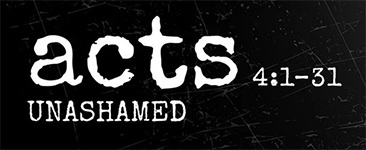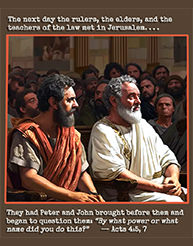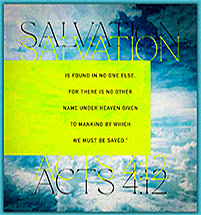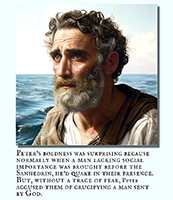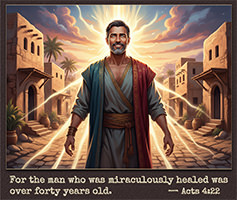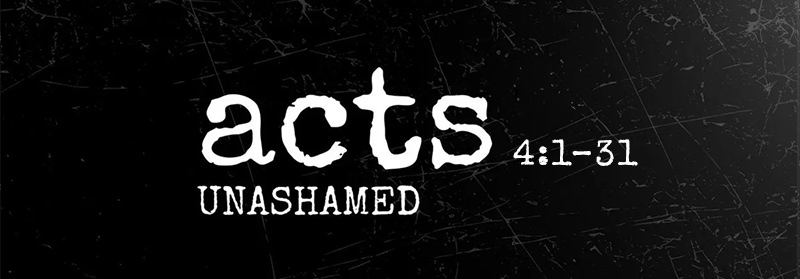
Acts 4:1–22 . . .
“Peter and John, Boldly Before the Sanhedrin”
Beginning in chapter 4, Luke alerts us to the fact that Peter and John were seized and jailed after their healing and preaching efforts. Let’s quickly review those circumstances leading up to their arrest. One day Peter and John went to the temple and saw a lame beggar seated near its gate. They commanded him “in the name of Jesus, walk.” In faith he obeyed and was instantly healed of a congenital affliction. News of the miracle spread rapidly throughout the temple; people rushed to see the lame man who could now walk and leap. They found him in the area known as Solomon’s Porch, where he was showing his gratitude, clinging to both apostles and praising God.
[Note: Find and read today’s Scripture near the bottom of this page.]
Acts 3–7 presents the early church’s explosive growth amid miracles, bold preaching, opposition from Jewish leaders, internal organization, and the first signs of persecution, culminating in Stephen’s martyrdom.
Peter Heals a Lame Beggar | He Speaks to the Onlookers (ch. 3)
Peter and John Before the Sanhedrin | Believers Pray and Share Possessions (ch. 4)
Ananias and Sapphira | The Apostles Heal Many and Are Persecuted (ch. 5)
Stephen Chosen | Stephen Seized by the Opposition (ch. 6)
Stephen’s Speech to the Sanhedrin | He Gets Stoned (ch. 7)
› Watch BibleProject’s superb animated video (2 min.) that highlights Luke’s account of the growing multi-ethnic Church.
Seeing the huge crowd gathering, Peter began to preach about Jesus. He declared that although the Jews rejected and killed Jesus, God raised him from the dead because he was God’s own Son, the Holy One. He called upon them to “repent and turn to God,” so that their sins might be blotted out. The same power of God that healed the lame beggar also worked to change listeners’ hearts as Peter preached. This sermon was even more fruitful than his previous one at Pentecost when the number of Christians amounted to 3,000 (2:41); at last count, five thousand men, besides women and children, were now saved.
The Authorities Arrest the Two Apostles (4:1–4)
Jewish authorities heard that followers of Jesus were teaching in the temple and affirming that Jesus had risen from the dead. No doubt they heard also that the apostles had stirred up the worshipers significantly by performing a healing miracle in the eyes of the multitude. Such information displeased them greatly. Why did this miraculous healing report upset the religious authorities as it did? Supposedly they were men of God!
The news upset them for two reasons: (1) The miracle was done “in the name of Jesus,” the man they’d executed as a troublemaker and false teacher; (2) As Sadducees, they didn’t believe in resurrection of the dead. [There were two main religious parties among the Jews: Pharisees and Sadducees, both professing allegiance to God’s law. But the Pharisees accepted the entire Old Testament as authoritative, whereas the Sadducees and many of the chief priests limited the Word of God to the five books of Moses, rejecting any doctrine that, in their view, was missing from his writings. Although the Sadducees admitted that God exists, they denied the existence of angels and demons (Acts 23:8), and they ridiculed the idea that dead bodies would someday come alive and rise from the grave. The division between the two parties was extremely bitter; they were constantly locked in heated debates.]
After the Jewish leaders were apprised of the happenings in Solomon’s Porch, priests and Sadducees personally rushed to the scene, bringing with them the captain of the temple (a.k.a. the police force). No doubt a contingent of his men came with him to deal with the disturbance. Roman soldiers never served as temple guards; they were barred from the inner precincts, open only to Jews. They couldn’t go in beyond the outer court, known as the Court of the Gentiles. Although the Romans exercised strong control of the Jewish nation, they didn’t challenge the right of the Jews to restrict access to their temple.
Along with the guards hurrying to Solomon’s Porch came the leaders themselves. Perhaps they accompanied the soldiers because of a past experience when, months earlier, they dispatched the same guards to arrest Jesus while he was teaching in the temple, but the soldiers came back empty-handed since some of them were sympathetic to Jesus. Now, to be sure that the soldiers wouldn’t fail to make the arrest, their superiors accompanied them. When the authorities arrived, they dispersed the crowd and arrested Peter and John. It was already evening, too late to bring the apostles before any tribunal, so the leaders decided to put them in jail until the next day, when they could assemble the rulers and conduct a hearing.
The Hearing Before the Council (vv. 5–12)
The next day, Peter and John were brought before an assembly of the important Jewish leaders. Priests, including Annas and his son-in-law Caiaphas, were there. Caiaphas was the current, Roman-appointed high priest, but Annas, a former high priest, wielded more power. Also present were John and Alexander from the priestly family, and many elders of the nation. Likely the assembly was a full session of the Sanhedrin, which was the ruling body of the Jews. It consisted of seventy-one members, including seventy elders and one president, the high priest. The same Sanhedrin examining Peter and John had met weeks earlier to try Jesus.
In v. 7b, the leaders asked the apostles, “By what power or what name did you do this?” Peter, “then filled with the Holy Spirit,” stepped forward and answered. The filling of the Holy Spirit that Peter (and other disciples) experienced in Acts 2:4 wasn’t a one-time event; it was something God wanted to keep doing in their lives. Instead of currying the favor of these leaders who could take his life, he started by criticizing their question. His logic is piercing: Why are we on trial for committing a good deed? He finished by accusing them of a significant crime. In his opening words, he implied that their question was inappropriate in a legal proceeding. The leaders resorted to using fuzzy language to avoid admitting that the alleged offense was a miraculous good deed — hardly grounds criminally indict. Peter declared that they healed a man through the name of Jesus Christ of Nazareth. To make the identification absolutely certain, he added that this Jesus was the very man the rulers had crucified.
Peter then argued that, when the Sanhedrin tried Jesus, their verdict sharply opposed God’s view of the Man under trial, whereas they killed him, yet God raised him from the dead. Peter went on to explain why God so honored Jesus, saying that Jesus was the figure described by the Psalmist: “The stone which the builders refused is become the head stone of the corner” (Psalm 118:22). The rulers would have understood Peter’s quotation of that psalm as a declaration that Jesus was the rightful king.
How then can we become part of God’s house? No one can join the people of God unless his sins have been forgiven through the blood of Christ. Therefore, Peter continued to point to Christ as the Savior from sin, emphasizing that there’s no other Savior. Jewish rulers believed that they could save themselves by keeping the law, but Peter warned them that they were deluded. He declared unequivocally in 4:12, “Salvation is found in no one else, for there is no other name under heaven given to mankind by which we must be saved.” Another name was probably in Peter’s mind: the name of Moses, whose books contain the law that the rulers viewed as their “road to God’s kingdom.”
Peter’s Boldness, the Council’s Weakness (vv. 13–18)
As presented in the video linked below, the rulers heard Peter and marveled at his boldness. They saw him as a common man. The words “unschooled” and “ordinary” don’t mean that he appeared to be stupid; they mean only that Peter had obviously received no training in either a Jewish rabbinical school or a Greek academy where he’d have learned the art of public speaking and how to build an argument based on the opinions of revered rabbis. His boldness was surprising because, normally when a man lacking social importance was brought before the Sanhedrin, he’d quake in their presence. He now speaks with unflinching clarity, accusing them of killing the holy and righteous One whom God raised from the dead. Without a trace of fear, Peter accused them of crucifying a man sent by God.
The power that flowed through Peter is available to us today. It’s impossible to be a good witness for Christ while remaining silent. We must make a hearty effort to tell others about our faith in Christ, verbally challenging them to consider his claims and salvation offer. It’s often difficult, albeit impossible, to witness with lasting results unless we call on and depend upon the Spirit of Jesus to collaborate with us in our witnessing efforts.
Standing with Peter and John was the man they healed (v. 14). The authorities must have taken him into custody along with the apostles. As the rulers gazed at the three disturbers of the peace, they reached two conclusions. First, that the three had been with Jesus, recognizing Peter and John as prominent men among Jesus’ disciples in days past. Second, they saw that the formerly lame beggar who’d often greeted them as they entered the temple was no longer lame but able to walk normally. Both conclusions made them feel uneasy. The strong connection between the two apostles and Jesus made it clear that the Jewish masses would credit Jesus with the miracle. The full restoration of the beggar forced them to abandon any hope of denying that the man had been miraculously healed. So they sent the detainees out of the council and discussed what to do. Their options were extremely limited. To everyone in Jerusalem, there was no denying that the apostles had performed a “notable sign.”
To avoid public criticism for having killed Jesus, the council decided to order Jesus’ followers to preach no longer. Calling in the apostles, the leaders threatened severe consequences if they continued to spread word of Jesus’ fame in his name. Notice that the leaders didn’t even consider the possibility that the apostles were doing God’s work. In our next segment, we’ll learn the reasons for their refusal to change their views.
Prioritizing Obedience to God (vv. 19–22)
The council didn’t succeed in intimidating the apostles. Peter and John were resolute in their determination to bring souls into fellowship with Christ. They refused to obey their rulers, saying that their higher obligation was to obey God. Their exact words (v. 19) were these: “Which is right in God’s eyes: to listen to you, or to him? You be the judges!” Although they didn’t reveal anything about their commission to evangelize the world, they stated that their duty to God required them to speak of recent events. The Sanhedrin understood that they were including Jesus’ resurrection.
Peter’s closing declaration, “As for us, we cannot help speaking about what we have seen and heard,” confirmed that he and John must speak of those things they’d seen and heard; they had to, not only because of the inner compulsion of the Holy Spirit, but also because of Jesus’ command prior to ascending: “You shall be witnesses to me in Jerusalem” (1:8).
After Peter and John refused to stop preaching in the name of Christ, the Sanhedrin desired greatly to punish the apostles, but feared taking any action that would further diminish their own popularity. The whole city was glorifying God for the miracle the apostles had performed. Everyone was overjoyed at God’s goodness to a man who’d been lame for more than forty years (enlarge photo). The council at last decided to do nothing beyond making more threats. After trying to frighten the apostles into silence, they let them go.
Luke concludes that “All the people were praising God for what had happened.” This whole situation started out looking pretty bad. Peter and John were on trial before the same court that sent Jesus to Pilate for crucifixion. Satan meant it all for great evil, but before it was all over, see what God had done: Two thousand more people came to believe on Jesus; Peter was filled with the Holy Spirit again; Peter got to preach Jesus to the leaders of the Jews; hostile examiners confirmed a miraculous healing; Jesus’ enemies were confused; Peter and John became bolder for Jesus than ever before; God was glorified.
† Summary of Acts 4:1–22
This passage shows Peter and John arrested for preaching Jesus and the resurrection, boldly testifying before the Sanhedrin, and then being threatened and released because the healed man stands as undeniable evidence. The passage highlights both opposition to the gospel and the apostles’ Spirit‑given courage and obedience to God rather than human authorities.
Key points with verse references:
• Religious leaders, disturbed that Peter and John are teaching the people and proclaiming in Jesus the resurrection of the dead, arrest both of them and put them in jail; yet many who hear the message believe, and the number of men grows to about five thousand (Acts 4:1–4).
• The next day, rulers, elders, and teachers of the law question Peter and John, asking by what power or name the lame man was healed; Peter, filled with the Holy Spirit, declares that it was by the name of Jesus Christ of Nazareth, whom they crucified and whom God raised from the dead. He boldly affirms that salvation is found in no one else (vv. 5–12).
• Seeing the courage of Peter and John and the healed man standing with them, the council can say nothing; after private discussion they decide only to command the apostles not to speak or teach at all in the name of Jesus. But Peter and John insist they can’t help speaking about what they’ve seen and heard, so the leaders further threaten them and then release them, unable to punish them because all the people are praising God for the miracle done to the man over forty years old (vv. 13–22).
- Q. 1 Why must we insist on Jesus being the only way to receive the gift of salvation?
- Q. 2 Are there examples in Scripture or history of believers whose faithfulness to God made them outlaws in government’s eyes?
- Q. 3 When, if ever, do you feel that Peter’s response to the political and religious leaders would be appropriate for a Christian to make today?
- Q. 4 How do you reconcile this passage with Romans 13:1–4?
- Q. 5 How has knowing Jesus shaped your character so that people will notice you have “been with Jesus”?
Acts 4:1–22
New International Version (NIV)
[View it in a different version by clicking here; also listen to chapter 4.]
† Watch this video clip of Acts 4:1–5:26, starring Bruce Marchiano as Jesus, James Brolin as Simon Peter, Harry O. Arnold as Saul/Paul, and Dean Jones as Luke.
Peter and John Before the Sanhedrin
4 The priests and the captain of the temple guard and the Sadducees came up to Peter and John while they were speaking to the people. 2They were greatly disturbed because the apostles were teaching the people, proclaiming in Jesus the resurrection of the dead. 3They seized Peter and John and, because it was evening, they put them in jail until the next day. 4But many who heard the message believed; so the number of men who believed grew to about five thousand.
5The next day the rulers, the elders and the teachers of the law met in Jerusalem. 6Annas the high priest was there, and so were Caiaphas, John, Alexander and others of the high priest’s family. 7They had Peter and John brought before them and began to question them: “By what power or what name did you do this?”
8Then Peter, filled with the Holy Spirit, said to them: “Rulers and elders of the people! 9If we are being called to account today for an act of kindness shown to a man who was lame and are being asked how he was healed, 10then know this, you and all the people of Israel: It is by the name of Jesus Christ of Nazareth, whom you crucified but whom God raised from the dead, that this man stands before you healed. 11Jesus is
“‘the stone you builders rejected,
which has become the cornerstone.’
12Salvation is found in no one else, for there is no other name under heaven given to mankind by which we must be saved.”
13When they saw the courage of Peter and John and realized that they were unschooled, ordinary men, they were astonished and they took note that these men had been with Jesus. 14But since they could see the man who had been healed standing there with them, there was nothing they could say. 15So they ordered them to withdraw from the Sanhedrin and then conferred together. 16“What are we going to do with these men?” they asked. “Everyone living in Jerusalem knows they have performed a notable sign, and we cannot deny it. 17But to stop this thing from spreading any further among the people, we must warn them to speak no longer to anyone in this name.”
18Then they called them in again and commanded them not to speak or teach at all in the name of Jesus. 19But Peter and John replied, “Which is right in God’s eyes: to listen to you, or to him? You be the judges! 20As for us, we cannot help speaking about what we have seen and heard.”
21After further threats they let them go. They could not decide how to punish them, because all the people were praising God for what had happened. 22For the man who was miraculously healed was over forty years old.

